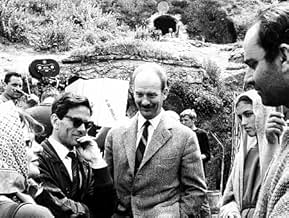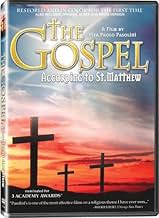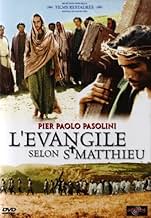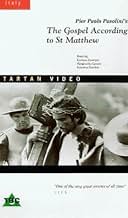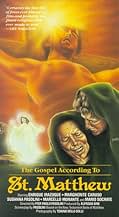The life of Jesus Christ according to the Gospel of Matthew. Film shows Christ as a Marxist avant-la-lettre and therefore uses half of the text of Matthew.The life of Jesus Christ according to the Gospel of Matthew. Film shows Christ as a Marxist avant-la-lettre and therefore uses half of the text of Matthew.The life of Jesus Christ according to the Gospel of Matthew. Film shows Christ as a Marxist avant-la-lettre and therefore uses half of the text of Matthew.
- Director
- Writer
- Stars
- Nominated for 3 Oscars
- 7 wins & 9 nominations total
- Caifa
- (as Rodolfo Wilcock)
- Director
- Writer
- All cast & crew
- Production, box office & more at IMDbPro
Featured reviews
Pasolini's Biblical adaptation of the Gospel of Matthew far surpasses present day movies of this genre in its overall effect on the viewer. The real substance of the film, the story of Jesus, is not glossed over with big budget extras, professional actors, and special effects which only seem to overshadow the awe inspiring wisdom of the words spoken by Jesus in the New Testament.
The fact that the actors are of Mediterranean decent only serves to make the film more believable. The costumes and settings appear to be more realistic than the Hollywood versions that I have seen in other Biblical films. The Jewish Church leaders with their alien looking hats show how detached and imposing these figures must have appeared to the common people of the time of Jesus. When Jesus threatens their positions of power by bringing God directly to the people without need of a temple or an interpreter it sheds light on how these leaders felt threatened by a "poor son of a carpenter".
Most films of this genre focus more on the Romans oppression of Jesus without showing the betrayal by the Jewish leaders that led to the unjust crucifixion of Jesus.
I highly recommend this film to anyone who has become bored with seeing the story of Jesus on film. If you think that you have seen it all and do not want to sit through yet another trumped up version of the story of Jesus then I suggest that you view this movie, for it succeeds where all others have failed.
Jesus and his 12 followers are a group of involved young men, who champion for revolutionary concerns. The youth and inexperience of the actors gives a fascinating sense of the fragility of the Christian movement itself in its very beginnings. The iconic-like closeups are a reminiscent of medieval, religious pictures whereas Enrique Irazoqui, who plays Jesus, seems like as if he descended right from a El Greco painting with his thin figure and slim, long face. The music from Bach and Mozart, as well as Blues recordings conveys additional meaning: The cry of revolt and the demand to be heard and received by the people and its authorities. It becomes utterly touching when the film dissolves into melancholy and passion by the power of Bach's classical music chorus and the blues.
The cinematography is remarkable and takes in many scenes the position of a third person telling the story. The intensely textual and dramaturgic reference to the biblical model, the amateurish performances of the actors and the waive of any pathos gives the film a strong naturalistic nuance. Jesus is less the son of god, but more an ideological fighter who gives radical speeches. But, Pasolini does not demystify the figure of Christ, nor does he question the set dogmas of the official church. He rather accentuates the social facets of Jesus' life and work and gives it an unforeseen political smack
Enrique Irazoqui, who plays Jesus, gives an excellent performance. He brings an intensity and harshness to the role that is very much in accord with the Jesus portrayed in numerous passages of the gospels. Margherita Caruso, who plays Mary as a young women, is an inspired choice. Although she does very little, and I cannot truly commend her for her acting, she has an amazing presence in this film, combining serenity, holiness, and innocence.
Pasolini paces the film well. It never drags, and never passes over subjects or incidents too quickly. The heroic quality of Jesus' life is strongly emphasized, his confrontations with existing religious authorities, his preaching of his message throughout Palestine, his bravery before the Roman authorities, and so on. Through demonstrations of his resolve, composure, and sternness, a real sense of the courage and dynamism of the character of Jesus is produced.
Pasolini's choices of locations could not have been better, and the scenes are staged and filmed skillfully, emphasizing the right emotions at the right times, whether those are feelings of sympathy, courage, or awe. I would not go so far as to say that any of these elements demonstrate brilliance, but they are very well done.
I was impressed with Pasolini's use of the gospels, which provide the bulk of what the character of Jesus actually says. I might note, also, that the harshness of much of the message is left intact. Conservative Christians might find this appealing, in that the director does not sanitize the message. Certainly, the pope enjoyed it. Pasolini received a medal from him. Non-Christians, and more liberal Christians, might find parts of the message to be a little frightening. When some of the harsher elements, especially the religious exclusivism (i.e., only those who believe in Christ have hope) are heard as spoken dialogue, rather than as words printed on a page, their impact is much greater, whether it is more disturbing or more inspiring. The film is a powerful evocation of the life of an important religious figure, and can be enjoyed by both believers and non-believers.
The film does have it's faults, however. The scene in which the "massacre of the innocents" is shown is poorly done. I personally found the depiction of the event to be somewhat comical, which clearly was not Pasolini's intention. The score, which draws on a variety of genres of Christian religious music is, by itself, beautiful. Unfortunately, I felt that it did not complement the film. The juxtaposition of disparate musical traditions with one another, and with the harsh world being visually depicted weakened the effect of both, had either stood on its own. I should say that these are relatively minor complaints. The film as a whole is a moving and impressive work. I do not think that it is as impressive a work as any of Pasolini's "Trilogy of Life" films, but it is a great film nonetheless.
Did you know
- TriviaPier Paolo Pasolini used non-professional actors and cast local peasants, shopkeepers, factory workers, and truck drivers. For Mary at the time of the Crucifixion, he cast his own mother Susanna Pasolini.
- GoofsWhen they are taking Christ down from the cross, in the distance you can see a car driving around a corner.
- Quotes
[last lines]
Christ: All authority has been given to me in heaven and earth. Go, therefore. And make disciples of all nations, baptizing them in the name of the Father, and of the Son and the Holy Ghost, teaching them to observe everything I have commanded you. And behold. I am with you always even unto the end of the world.
- Alternate versionsThe 2007 DVD release features a colorized, English-dubbed version with a run time of 91 minutes and an Italian-language black and white version running 136 minutes.
- ConnectionsEdited into Histoire(s) du cinéma: Une histoire seule (1989)
- SoundtracksMatthäus Passion (BWV 244)
Written by Johann Sebastian Bach
nr 78: Wir setzen uns mit Tränen nieder
nr 47: Erbarme Dich (musical intro)
- How long is The Gospel According to St. Matthew?Powered by Alexa
Details
- Release date
- Countries of origin
- Language
- Also known as
- El Evangelio según san Mateo
- Filming locations
- Castel Lagopesole, Avigliano, Basilicata, Italy(Sanhedrin trial of Jesus, in castle's courtyard)
- Production companies
- See more company credits at IMDbPro
Box office
- Gross worldwide
- $16,572
- Runtime
- 2h 17m(137 min)
- Color
- Sound mix
- Aspect ratio
- 1.85 : 1


